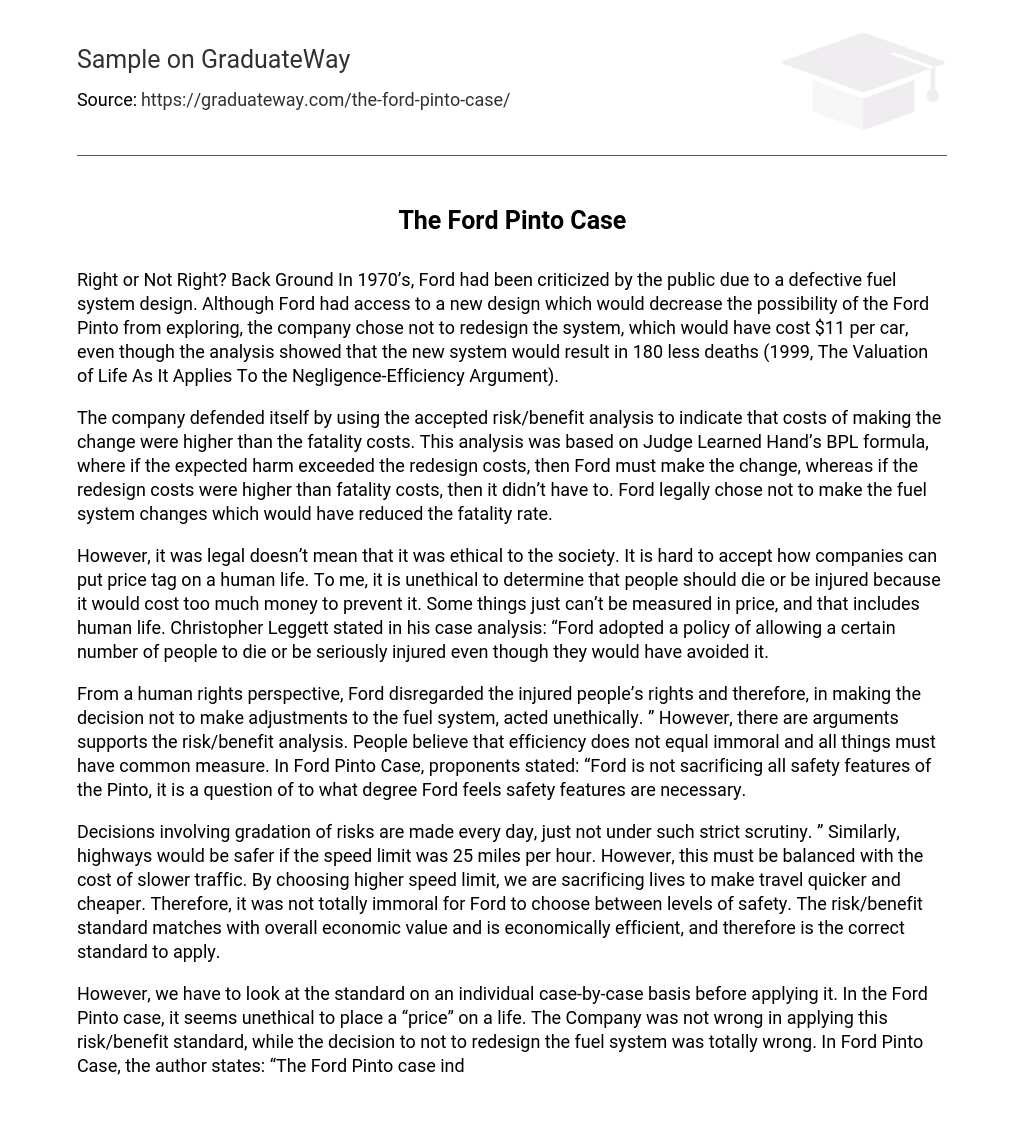Right or Not Right? Back Ground In 1970’s, Ford had been criticized by the public due to a defective fuel system design. Although Ford had access to a new design which would decrease the possibility of the Ford Pinto from exploring, the company chose not to redesign the system, which would have cost $11 per car, even though the analysis showed that the new system would result in 180 less deaths (1999, The Valuation of Life As It Applies To the Negligence-Efficiency Argument).
The company defended itself by using the accepted risk/benefit analysis to indicate that costs of making the change were higher than the fatality costs. This analysis was based on Judge Learned Hand’s BPL formula, where if the expected harm exceeded the redesign costs, then Ford must make the change, whereas if the redesign costs were higher than fatality costs, then it didn’t have to. Ford legally chose not to make the fuel system changes which would have reduced the fatality rate.
However, it was legal doesn’t mean that it was ethical to the society. It is hard to accept how companies can put price tag on a human life. To me, it is unethical to determine that people should die or be injured because it would cost too much money to prevent it. Some things just can’t be measured in price, and that includes human life. Christopher Leggett stated in his case analysis: “Ford adopted a policy of allowing a certain number of people to die or be seriously injured even though they would have avoided it.
From a human rights perspective, Ford disregarded the injured people’s rights and therefore, in making the decision not to make adjustments to the fuel system, acted unethically. ” However, there are arguments supports the risk/benefit analysis. People believe that efficiency does not equal immoral and all things must have common measure. In Ford Pinto Case, proponents stated: “Ford is not sacrificing all safety features of the Pinto, it is a question of to what degree Ford feels safety features are necessary.
Decisions involving gradation of risks are made every day, just not under such strict scrutiny. ” Similarly, highways would be safer if the speed limit was 25 miles per hour. However, this must be balanced with the cost of slower traffic. By choosing higher speed limit, we are sacrificing lives to make travel quicker and cheaper. Therefore, it was not totally immoral for Ford to choose between levels of safety. The risk/benefit standard matches with overall economic value and is economically efficient, and therefore is the correct standard to apply.
However, we have to look at the standard on an individual case-by-case basis before applying it. In the Ford Pinto case, it seems unethical to place a “price” on a life. The Company was not wrong in applying this risk/benefit standard, while the decision to not to redesign the fuel system was totally wrong. In Ford Pinto Case, the author states: “The Ford Pinto case indicates there is a belief held by most of the public that it is wrong for a corporation to make decisions which may sacrifice the lives of its customers in order to reduce the company’s cost or increase its profits. When we change the topic to whether we should let engineers to rebuild some problematic highways to prevent accidents, even though the costs of making the change were much higher than the fatality costs. I believe the answer is clear now. Reference: Christopher Leggett. The Valuation of Life As It Applies To the Negligence-Efficiency Argument. 1999. http://www. wfu. edu/~palmitar/Law&Valuation/Papers/1999/Leggett-pinto. html





